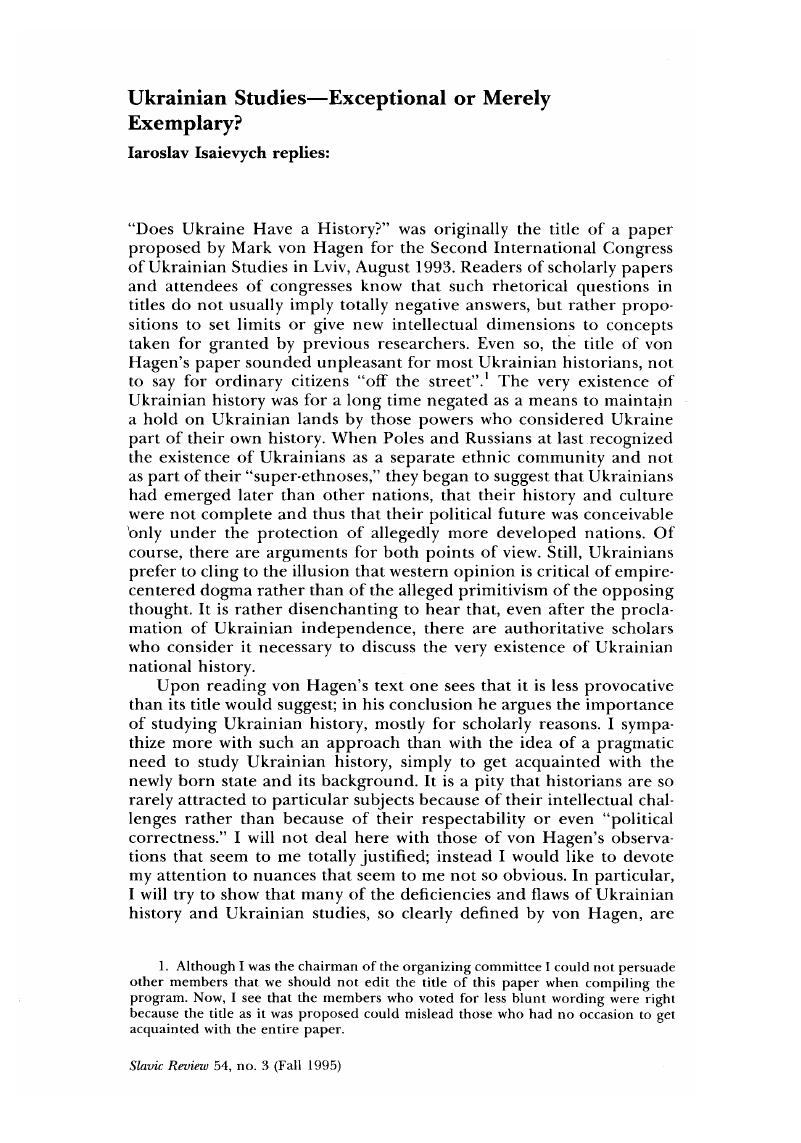Published online by Cambridge University Press: 27 January 2017

1. Although I was the chairman of the organizing committee I could not persuade other members that we should not edit the title of this paper when compiling the program. Now, I see that the members who voted for less blunt wording were right because the title as it was proposed could mislead those who had no occasion to get acquainted with the entire paper.
2. Isajewytsch, J, “Die mittelalterlichen Wurzeln der ukrainischen Nation,” Ukraine: Gegenwart und Geschichte eines neuen Staates, eds. Hausmann, Guido and Kappeler, Andreas (Baden-Baden: Nomos Verlag, 1993), 31–48.Google Scholar
3. A good example was Jewish history. Even in Stalin's times many Soviet teachers and students doubted, though surely not aloud, whether the great leader was correct in denying the existence of a Jewish nation because of its lack of territorial cohesiveness.
4. I call my high school Ukrainian because of its language of teaching. At the Ivan Franko University of Lviv where I studied in 1952–1957, some courses were in Ukrainian but others in Russian, and the official program was not Ukrainian-oriented.
5. Strange as it may seem, Russian scholars still have not realized the importance of Ukrainian subjects for Russian studies as such. Even for those who declare Ukrainian history be a part of Russian history, things Ukrainian, perhaps on a subconscious level, are felt alien. On the other hand, contrary to von Hagen's view, the Polish historical community took the initiative in organizing Polish-Ukrainian scholarly forums. There are more studies on Ukraine published in Poland than in any other country except Ukraine; many of those are excellent.
6. Some of those who remain for von Hagen “professional ethnics” learned Ukrainian only at universities.
7. It is strange that authors who have forgiven so many contemporary democratic Ukrainian politicians for their communist past will not extend that forgiveness to historians who are now sincere and serious critics of totalitarianism.
8. A more balanced evaluation of historical works which appeared in Soviet Ukraine is in the bulletin Recenzija: A Review of Soviet Ukrainian Scholarly Publications published by the Harvard Ukrainian Research Institute in 1970–1979, tactfully prepared so as not to provoke repression against the authors. There were Soviet Ukrainian historians who were only apologists of the regime and others who strove for a decent level of scholarship and to repackage elements of Ukrainian patriotism in an ideologically accepted form. Good insight into the conflict between them is provided in a P.D. dissertation by Ivan Myhul, “Politics and History in the Soviet Ukraine” (Columbia University, 1970). I would like to stress especially the importance of the periodicals Arkhivy Ukrainy and Istorychni dzerela ta ikh vykorystannia, both edited by Ivan L. Butych: Pritsak, O, “A Serial Publication and a Political Era: An Obituary with a Post-Scriptum,” Recenzija 6, no. 2 (1976) 31–51.Google Scholar